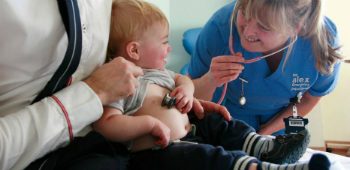
Skills, education and training
Nursing children and young people needing palliative care and end of life
Over 49000 babies, children and young people are estimated to have life-limiting conditions in the UK, representing a wide range of over 350 diagnoses.
Nurses are key members of the team providing palliative and end of life care to babies, children and young people and providing support to the child’s family members and loved ones.
Nurses are providing increasingly complex, encompassing general and specialist care provision across an age spectrum that extends from neonates to adolescents and young adults in in-house and community settings. Children and young people have a right to be cared for by nurses who have the right knowledge and skills to meet their needs. The nursing role in palliative and end of life care is incredibly varied, depending on the child’s condition and circumstances, the care may last for a few hours, days, months or years.
Nurses provide palliative and end of life care in a variety of settings, including the child’s own home and community; specialist settings such as children’s hospices and other NHS settings from general wards through to highly specialist areas such as burns units and intensive care.
The Nursing and Midwifery Council (2008) confirmed a series of principles to underpin work with children and young people, namely:
- making the care of children, young people and their parents the first concern, treating them as individuals and respecting their dignity
- working with others to protect and promote the health and well-being of those in their care, their families and carers, and the wider community
- providing a high standard of practice and care at all times
- being open and honest, acting with integrity and upholding the reputation of the profession.
Key skills
These include:
Competence: all nurses should be competent to provide age-appropriate, compassionate and sensitive palliative and end of life care with the support of the wider multi-disciplinary team. RCN Competences: Palliative Care for children and young people (2018) is a framework which sets out specific competences are required for the nursing and support staff who will work closely with families and other care providers to ensure the best possible quality of life for the child/young person and support for their family.
Communication skills: including the ability to initiate or take part in conversations about death and dying
Assessment: the ability to assess a child’s needs, in partnership with the child and family
Coordination: children, young people and young adults must receive age-appropriate care to meet their specific needs, this may involve a wide range of professionals, it is important that this care is coordinated. Nurses are ideally placed to act as a care/service navigator to guide and support children, young people and their families, friends and carers through the care maze.
Advocacy: Nurses working with children and young people will need to balance the rights of that child/young person with those involved in their care. They will need to apply professional codes of practice and legal requirements, such as confidentiality, information sharing, consent, service provision, rights, anti-discriminatory practice and safeguarding issues, to the practical provision of care and support of individual children and young people and their families.
Education and Training
Nurses are providing increasingly complex care, encompassing general and specialist care provision across an age spectrum that extends from neonates to adolescents and young adults in in-house and community settings. Children and young people have a right to be cared for by nurses who have the right knowledge and skills to meet their needs. The nursing role in palliative and end of life care is incredibly varied, depending on the child’s condition and circumstances, the care may last for a few hours, days, months or years.
To develop the key skills to provide age-appropriate, compassionate and sensitive palliative and end of life care with the support of the wider multi-disciplinary team, nurses may choose a variety of different routes - from clinical skill development, local service study days through formalised learning to building academic careers through to PhD qualifications.
Palliative and end of life care for children and young people

Children and young people forums

CYP facebook forum page
This Facebook group is a space for you to have professional discussions relevant to your field of practice. The group is for forum members only.
Page last updated - 15/07/2023






